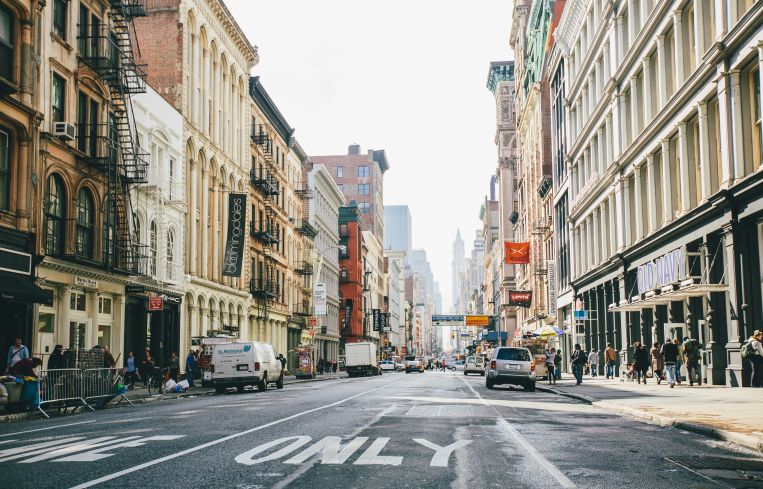NYC Retail Asking Rents Could Recover by End of Year, But Recession Could Hurt Things
By Celia Young June 30, 2022 1:35 pm
reprints
The average asking rent for retail space in New York City is expected to return to pre-pandemic levels by the end of the year, but inflation and an anticipated recession could impact the industry’s recovery.
New York City’s average retail asking rent rose to $57.95 per square foot in March, increasing 2.9 percent year-over-year, according to Marcus & Millichap’s recently released second-quarter retail report. The report anticipated the city’s average asking rent will hit the 2019 price of $58.45 per square foot by year’s end.
Those improved rents were not felt evenly across the five boroughs. Average asking rents in Manhattan, at $97.53, and the Bronx, at $40.31, were lower than pre-pandemic levels in the first quarter of 2022 while Brooklyn, Queens and Staten Island each saw asking rents higher than 2019 numbers, according to the Marcus & Millichap data.
“Retail is an anomaly everywhere,” said Trever Gallina, vice president of retail property sales for Marcus & Millichap. “It’s the story of the have and the have-nots.”
That’s certainly clear in the city’s vacancy rates. New York City’s vacancy rate overall declined to 3.9 percent in March, and vacancy rates for each of the five boroughs were below the 2019 levels recorded by the New York City Council. But within Manhattan, which had a vacancy rate of 4.6 percent in the first quarter, Downtown Manhattan’s vacancy rate climbed to 9 percent, according to the Marcus & Millichap report. Spaces in high-traffick residential areas tended to fare better than office districts.
Clothing, home furnishing stores and restaurants have been the main drivers of leasing activity in the city over the past few months, grabbing space mostly in SoHo and around Grand Central Terminal, according to preliminary CBRE data.
Clothing and textile stores leased the largest amount of square footage in the city between April and June, followed by home furnishing retailers, according to CBRE. And luxury was leading the pack. In two of the biggest deals of the second quarter so far, Italian luxury furniture brand Poltrona Frau snagged 19,000 square feet to relocate its flagship location to 181 Madison Avenue from 151 Wooster Street, and U.K.-based high-end clothing retailer AllSaints took 19,000 square feet at 575 Fifth Avenue.
“Luxury has proven itself to do really, really well. It bounced back very quickly,” Gallina said. “You can’t find space in SoHo — which is why people are going there.”
SoHo exceeded expectations when it came to leasing thanks to its rich residents and high foot traffic. The neighborhood had the highest number of buildings seeing new leases or renewals, at six, and the second-highest amount of square feet leased between April and June, surpassed only by the area around Grand Central, according to CBRE.
The restaurant and hotel market has also been on fire. It was the third-biggest industry taking the most square footage in the city between April and June, according to CBRE data.
“If you can vent it, you can rent it,” Brandon Singer, CEO and founder of retail brokerage Retail by MONA, said. “There’s obviously a limit to the amount of spaces that are out there [with vents for cooking exhaust so] restaurants are gobbling up stores that especially have infrastructure that already exists.”
The city’s appetite for restaurants is in line with national trends. Restaurant and bar sales accounted for the highest share of monthly retail sales in May since the start of the pandemic, at 17.7 percent, while foot traffic was up nationwide by 9 percent, according to Marcus & Millichap.
However, all that positive retail momentum could be kneecapped by inflation and economists predicting a recession hitting the country this year.
“I think there are a lot of tenants holding their breath and just trying to figure out where the world will be,” Lon Rubackin, senior vice president at CBRE, said.
Those economic trends haven’t been felt by the city’s retail leasing numbers yet because of the amount of time it takes to close a deal, but Rubackin expected a slowdown could happen if a recession occurs.
“I haven’t seen it affect any retailers looking for space or committing to space at this point yet [but] logic tells us maybe it will happen,” he said.
As fears of a recession mount, retail investors have been flocking to grocery stores, which have generally been safe bets during an economic downturn, Marcus & Millichap’s Gallina said.
And the city’s investment sales market has also started to see signs of improvement. The average price per square foot of a retail property in New York City increased for the first time since 2018 to $592 per square foot at the end of the first quarter of 2022, a $10 increase compared to the same quarter last year, according to Marcus & Millichap.
Celia Young can be reached at cyoung@commercialobserver.com.



